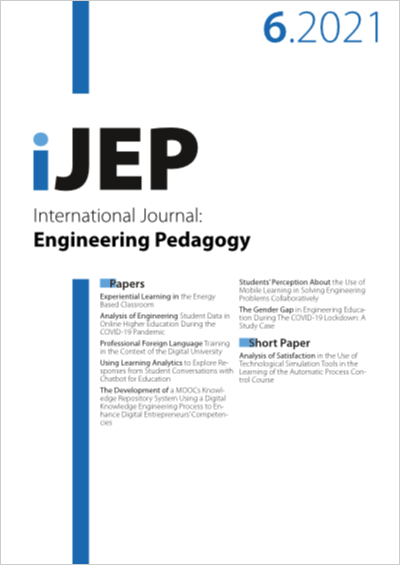Professional Foreign Language Training in the Context of the Digital University
Example of Modeling and Experimental Validation
DOI:
https://doi.org/10.3991/ijep.v11i6.23421Keywords:
Digitalization, Educational environment, Foreign language learning, Professional competence, Pedagogical conditions.Abstract
Currently, the practical level of foreign language proficiency of philology graduates does not always correspond to the social order of society. In this paper, a model for professional foreign language training of philology stu-dents was developed, theoretically justified and experimentally tested. For this purpose, the Moodle tool was widely deployed and we identified and ex-perimentally tested pedagogical conditions that ensure the effectiveness of professional foreign language training for philology students. The experi-mental work involved a random sample of 305 students of the "bachelor" level of the training direction 5B021000 (6B023)–foreign philology. The re-sult of the qualitative and quantitative analysis allows to conclude the effec-tiveness of the proposed model of professional foreign language training of philology students based on Moodle, which is confirmed by the calculations during the statistical processing of the research results. The scientific novel-ty of the study is that the pedagogical conditions that ensure the effective-ness of the Moodle-based professional foreign language training of philology students were identified and experimentally tested. The results of the study showed the effectiveness of using distance learning in the current health context due to the COVID-19 pandemic.
Downloads
Published
2021-12-06
How to Cite
Rizakhojayeva, G., Yussupova, G., Mamyrbayeva, B., & Meirbekov, A. (2021). Professional Foreign Language Training in the Context of the Digital University: Example of Modeling and Experimental Validation. International Journal of Engineering Pedagogy (iJEP), 11(6), pp. 50–69. https://doi.org/10.3991/ijep.v11i6.23421
Issue
Section
Papers
License
Copyright (c) 2021 Gulnara RIZAKHOJAYEVA, Guzal YUSSUPOVA, Bagila MAMYRBAYEVA

This work is licensed under a Creative Commons Attribution 4.0 International License.


